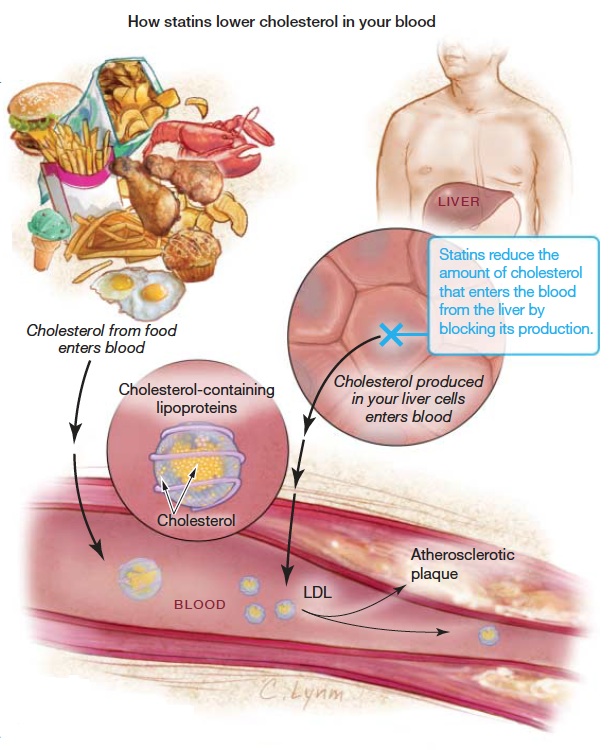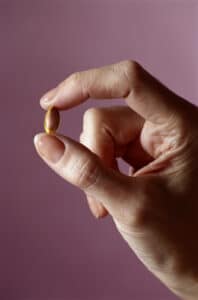Statins
- Posted on: Aug 1 2013
Statins (HMG-CoA reductase inhibitors) are medications that were developed to lower bad cholesterol (LDL) and have now been used for a quarter of a century with a very favorable safety profile. Cholesterol is a waxy material produced by humans and is also found in saturated fats and animal products. For more on abnormal or high cholesterol levels and cholesterol itself, click here.
The 2 main kinds of cholesterol are the “bad” cholesterol (LDL-C or low-density lipoprotein cholesterol) and the “good” cholesterol (HDL-C or high-density lipoprotein cholesterol). While the cells in our bodies need cholesterol to work properly, LDL builds up in arteries to form plaque, which can block arteries and can contribute to high blood pressure, heart disease, and the risk of heart attack or stroke. This is a process called atherosclerosis. HDL helps the body get rid of bad cholesterol. For most people, the lower the bad cholesterol, the better and the higher the good cholesterol, the better. While achieving optimal cholesterol levels starts with exercise and a healthy diet, genetics also plays a prominent role and often healthy lifestyle alone is not always enough.
When it comes to your heart, you shouldn’t take any chances. Many people either have or are predisposed to heart disease, and few of us know what to do about it. Exercise and a proper diet can only help to a certain extent, and with the amount of medications available, it’s hard to figure out what works. Lowering cholesterol levels is generally beneficial but how it is done is just as important. This is why many doctors prescribe statins. Statins are now the most-prescribed drug category, with over 214 million monthly prescriptions annually as of 2012.

From JAMA, April 3, 2013—Vol 309, No. 13 1419
Using Statins: Benefits and Risks
In the appropriate patient, statins prevent heart attacks and strokes not only by lowering the cholesterol in your blood stream but by keeping your arteries healthy. More important than treating your cholesterol, is that statins treat arteries which reduces the risk of heart attack or stroke. In fact, in people at the highest risk or heart attack or stroke, statins are helpful even if the cholesterol level is low or normal. On the other hand, does everyone with high cholesterol need a statin? Doctors often look at other risk factors (such as high blood pressure, diabetes, family history or smoking) to help determine your chances of developing a heart attack or heart disease to help decide. It often is helpful to actually look at your arteries to help determine how healthy they are (or aren’t) to help decide if statin therapy is indicated such as with coronary calcium scans or carotid IMT.
For the latest on new 2013 guidelines regarding the treatment of high cholesterol with statins, click here.
While statins are generally quite safe and extremely well tolerated, just like any medication, they can have side effects. The most common side effect is muscle aches or pain or weakness, most often mild and even tolerable. Other side effects can include nausea, constipation or diarrhea, or liver abnormalities. A small number of people seem to have modest elevations of their blood sugar which can very slightly increase the chance of a diagnosis of type 2 diabetes (see below for more on this).
People have a lot of questions about this particular kind of drug, so let’s address some of them below.
6 Frequently Asked Questions about Statins
- What do statins do? As stated above, statins lower the levels of cholesterol in your blood stream to reduce your risk of chest pain, heart attack, and stroke. The use of statins has also been linked to many other possible (but so far unproven) health benefits, a few of which include reducing the risk of esophageal, kidney, and prostate cancer, reducing the rate of osteoarthritis, dementia and Parkinsons, and reducing rates of erectile dysfunction.
- Are there other options? While other drugs do exist to help reduce the risk of heart disease, none of them work quite as effectively as statins do. In fact, use of most other cholesterol-lowering medications has been declining as use of statins has been increasing. Research is ongoing to help develop other cholesterol lowering medications that also lead to improved outcomes.
- What are the side effects? Typical side effects for statins include muscle aches and pains, headaches, diarrhea, and rash, although these side effects are usually minor if even felt. The only two major side effects, both of which happen rarely if ever, are liver failure and skeletal muscle damage. In the end, for appropriate patients, the benefit of statins reducing the chance of heart attack, stroke or premature death much outweighs the risk of very infrequent possible side effects that can be managed.
- What about Diabetes? Recently, there has been concern about a higher risk of diabetes in people taking statins. However, this should be placed in proper perspective. The absolute excess risk of diabetes developing in people on higher-dose statins was 0.12% (or 12 in 1000 people on statins). In patients on statin drugs who have never had a heart attack, about 1 in 1,000 will develop diabetes per year while 5 heart attacks are prevented. For every one person developing diabetes, 3 hard cardiac events were prevented (heart attack and death, etc). In patients who have already had a heart attack or other atherosclerotic event, 3 cardiovascular events are prevented per year for every one becoming diabetic. The people who do develop diabetes while on statins tend to be older and/or pre-diabetic so are much more predisposed to developing it. In people whom already have diabetes, statins help reduce the odds of having heart attacks or strokes and cardiovascular disease is the most serious complication and cause of death in diabetics. It is our feeling that while statins might slightly increase blood sugar, they likely increase the chance of diabetes being diagnosed earlier in people whom already were prone to it. In the end, the benefit of statins reducing the chance of heart attack, stroke or premature death much outweighs the risk of developing diabetes.
- How effective are they? Statins are powerful because they block your cholesterol from the liver, where it is produced. Out of all of the prevention drugs, statins have been found as the most effective. In a Forbes article by Harlan Krumholz, he says that statins reduce your risk of heart attack by 20% and your risk of death by 10%. Higher doses or potencies may reduce these risks even more. They appear to have anti-inflammatory benefit on arteries and help keep arteries healthy in addition to just lowering cholesterol.
- Am I a candidate? Anyone with a 20% or higher chance of getting heart disease in the next 10 years may be a candidate for statins. Your age, weight, and whether or not you have high blood pressure or diabetes will also play a part in determining if these medications will be the right fit for you. People with a 5 – 20% chance of heart disease in the next 10 years might also be a candidate for statins. Given that the goal of statins is ultimately to keep arteries healthy, using technology that allows us to assess the actual state of your arteries, such as with carotid IMT, is becoming the preferred way to better determine who might most benefit from taking statins. In addition, while we traditionally have looked at risk of a heart attack over the next 10 years, we realize that plaque build up can occur over decades and using statins earlier in the process might actually reduce the lifetime risk of heart attack or stroke.
Click here for an illustrative presentation on how cholesterol lowering drugs work
Cardiologists in Los Angeles
To learn more about statins and the risks of heart disease, or to schedule an appointment, you can contact our office at (310) 659-0714. You can also fill out our online contact form or visit us on Facebook, Twitter, or Google+. We look forward to hearing from you.
Updated 01/05/14
Written by and/or reviewed by Mark K. Urman, M.D. and Jeffrey F. Caren, M.D.
PLEASE NOTE: The information above is provided for general informational and educational purposes only and should not be used during any medical emergency. The information provided herein is not intended to be a substitute for medical advice, nor should it be used for the diagnosis or treatment of any medical condition. Accordingly, it should not be relied upon as a substitute for consultation with licensed and qualified health professionals who are familiar with your individual medical needs. Call 911 for all medical emergencies. Links to other sites are provided for information only – they do not constitute endorsements of those other sites. Please see Terms of Use for more information.
© 2014 COR Medical Group, Inc. Los Angeles, California. All Rights Reserved
Posted in: Heart Health Blog



